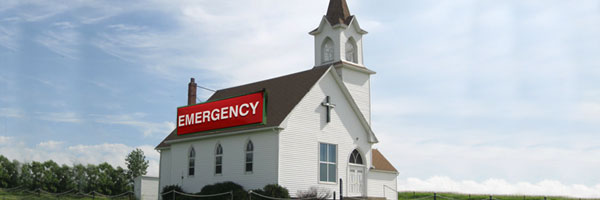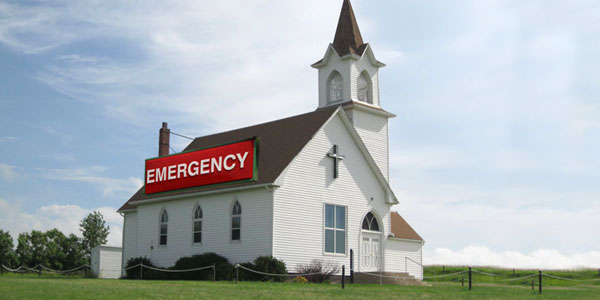An Opportunity Missed by Too Many Churches
Category : Christian Views on Disability , Church Inclusion , Disability Attitudes
Life with a Disability is Difficult and Lonely
Life always includes tragedy. And tragedy can be a time of loneliness and deep despair. But when you are part of a church, that tragedy can become an opportunity.
Tragedy and difficulty, whether temporary or long-term, is an opportunity for the church to truly be the church. Not every aspect of life with a disability involves such tragedy, or even difficulty, but it still provides the church with a unique opportunity to respond in a way that only a church really can.
So what keeps us so often from being that kind of church?
The church isn’t a country club. We’ve heard this before. We don’t pay dues (offerings) to pay for the club pro (the pastor) and the grounds crew and caddies (ministry staff) to make sure our tee-offs (services) are on time and everything is done efficiently.
A church whose members think of themselves as ‘belonging’ to a country club want a certain kind of clientele. They have their seat. They have their social clubs. They have their favorite preacher and worship-leader.
When tragedy befalls our country club-church, we respond with pity, with bitterness, and even an awkward social silence that says your kind of tragedy isn’t welcome here. This is particularly so for people who have disabilities. Disability is a constant difficulty, a reminder of sin and brokenness, and its presence in our church not only makes us uncomfortable, it mocks a self-righteous church life.
But it also Presents an Opportunity
It can be helpful to instead think of church as a hospital. Even better, perhaps, it’s a learning hospital. All of us need healing, but we also all need to learn how to heal others.
In tragedy and difficulty, the church-hospital to which we have been called becomes a place of healing, and, hopefully, a place where we learn how to heal.
Even–and perhaps, especially–for people who have disabilities, this kind of environment has profound potential. To see what God sees in the broken person, to call that person into His Kingdom, to equip that person to serve and worship Him with every fiber of their being. That is when the church truly becomes the church.
This all sounds fine in the abstract, but what, more precisely, does it mean?
Fortunately, God’s Word provides some very specific characteristics of the kind of hospital-church community we’re talking about:
- I Corinthians 12: Christ’s church is not homogenous. It is not made up of one kind of people. It is made into one people from many. Those many come from different economic backgrounds, social classes, ethnicities, levels of ability and education, and genders.
- Acts 4: That church shares everything, especially with those in need. In fact, the needy are not just an opportunity; they are a priority, for all time.
- Luke 14: The hospital-church is one that includes everyone, so that God’s house might be full. Everyone, the lame, the blind, those who are weak in body, weak in spirit, hungering and thirsting–all are invited to His eternal banquet.
- I Thessalonians 5: That church encourages one another, both those who have plenty and those who have nothing, into the work that God called them to do. Everyone is encouraged, not just those who have no troubles, but those who are in great need, are also encouraged to respond to God’s invitation.
- Matthew 28: The disciples were told to baptize, but even before that, they were called to make disciples. The church is about the business of making disciples, and again, not just of the clear of mind and the strong of limb. Everyone is to become a disciple, a living ‘epistle.’
- Ephesians 2: That church is full of people who do good works, not just because of what God did for us, or because it is an evidence of our faith, but moreso because that is precisely what God created us to do–to do the good works He has prepared in advance for everyone of us to do.
This is not the Kingdom of this World
The hospital-church is a place this world cannot understand. The kingdom of this world is where capability, difference, and wealth define the person. But in God’s kingdom we are defined, valued, encouraged, and equipped for one reason. We are all His. We all belong to Him. We are all called and equipped. We are all broken, and we are being and have been healed.
And in the process, we are simultaneously called not just to be healed, but to heal others. We are not just called to be disciples, but to make disciples. Not just to be encouraged but to encourage others.
This is the Kingdom of Heaven…and it is at Hand
This is something the church can do that no other entity has the call to do, nor the power or authority to do. And it is an opportunity that is starkly evident in the lives of people who live with disabilities. Don’t just seek our healing; equip us to heal others. Don’t just teach us about Jesus, equip us to teach others. Don’t just encourage us, come alongside us and together, we can encourage others, and continue to build His kingdom.
![]() Dan Vander Plaats is the Director of Advancement at Elim Christian Services in Palos Heights, Illinois, a ministry that exists to equip people who live with disabilities to answer God’s call on their lives. He is also a member of the advisory committee for Disability Concerns for the Christian Reformed Church. In 2009, he developed “5 Stages: The Journey of Disability Attitudes” as a resource for Elim. The 5 Stages helps churches and individuals assess their attitudes toward people with disabilities. He is married to Denise (Hiemstra), and is father to Ben and Emma. They are members of Orland Park Christian Reformed Church in Illinois.
Dan Vander Plaats is the Director of Advancement at Elim Christian Services in Palos Heights, Illinois, a ministry that exists to equip people who live with disabilities to answer God’s call on their lives. He is also a member of the advisory committee for Disability Concerns for the Christian Reformed Church. In 2009, he developed “5 Stages: The Journey of Disability Attitudes” as a resource for Elim. The 5 Stages helps churches and individuals assess their attitudes toward people with disabilities. He is married to Denise (Hiemstra), and is father to Ben and Emma. They are members of Orland Park Christian Reformed Church in Illinois.

